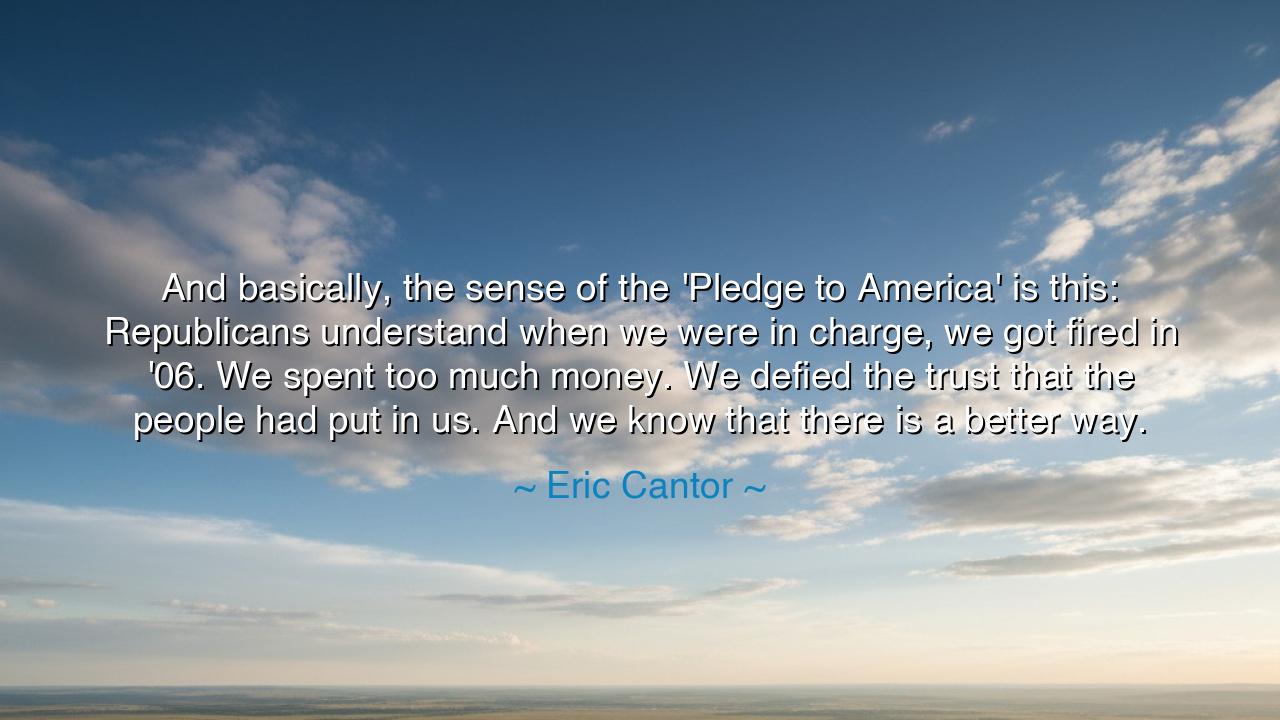
And basically, the sense of the 'Pledge to America' is this:
And basically, the sense of the 'Pledge to America' is this: Republicans understand when we were in charge, we got fired in '06. We spent too much money. We defied the trust that the people had put in us. And we know that there is a better way.






The words of Eric Cantor resound with the weight of confession and the spark of resolve: “And basically, the sense of the Pledge to America is this: Republicans understand when we were in charge, we got fired in ’06. We spent too much money. We defied the trust that the people had put in us. And we know that there is a better way.” In these lines, we hear the ancient rhythm of repentance followed by renewal. A people’s leaders admit their failure, acknowledge the breaking of faith, and declare that from the ashes of error, a new path must be forged.
The ancients often spoke of the sacred bond between ruler and ruled. When that bond was broken, the gods themselves were thought to withdraw their favor. The Athenians, who once entrusted power to leaders who squandered wealth and neglected virtue, turned swiftly upon them, casting them out by ostracism. For it was always understood: power is not a possession but a trust, a stewardship given by the people, and when it is misused, it is taken away. Cantor, in his words, acknowledges this eternal principle—that in 2006, the people, like the citizens of old, removed their confidence from those who had failed them.
But confession alone is not enough. What follows must be renewal. The words, “we know that there is a better way,” are not merely political; they echo the timeless theme of redemption. When Rome faltered under corruption and decay, men like Cincinnatus reminded the republic that simplicity, restraint, and service were the pillars upon which strength must stand. When leaders admit excess—“we spent too much money”—they acknowledge that prosperity is not sustained by indulgence, but by discipline, by balance, and by responsibility. In this, Cantor’s words take the shape of a vow: to return not to old habits, but to a wiser road.
History is filled with such cycles. Consider the example of England after the Glorious Revolution. The monarchy had squandered trust, reaching beyond its rightful limits, and the people, through Parliament, declared that government must once again serve, not dominate. Out of that recognition came a new constitutional balance, a pledge not unlike the one Cantor describes: an agreement between rulers and ruled that excess would give way to accountability, and broken promises would yield to a better way forward.
The heart of this saying lies in the word trust. When leaders lose the trust of the people, the very foundation of governance trembles. But when leaders admit their failings and strive for restoration, trust can be rekindled, like fire revived from embers. Cantor’s statement reflects this dynamic: a government or party is never beyond redemption if it is willing to confess error, learn from it, and set its course by the compass of responsibility and humility.
The lesson is thus: all power is conditional, resting upon the faith of those who bestow it. To betray that faith is to invite downfall; to admit fault and change is to invite renewal. This is true not only for governments, but for every relationship of stewardship—in families, in communities, in friendships. To squander trust is easy, but to regain it requires honesty, humility, and the courage to pursue a better way.
Practical actions follow: if you hold responsibility—whether over many or few—guard it well, for it is not your possession, but a sacred trust. When you fail, do not hide your fault, but confess it plainly, and let your actions prove your repentance. Spend not only wisely in money, but also in time, in words, and in promises, for each is a currency of trust. And remember always: to be given trust is to be given honor; to lose it is to be humbled; but to regain it is to be truly wise.






VKPham Van Khoi
Eric Cantor’s acknowledgment that Republicans 'spent too much money' and lost the trust of the people in 2006 seems like a step toward humility. But does this honesty truly signal a shift in priorities, or is it just a political move to regain power? What concrete steps are needed to ensure that this ‘better way’ is more than just words, and that they can rebuild the trust they lost with the American people?
MQNguyen Minh Quan
The 'Pledge to America' offers an opportunity for Republicans to rebuild trust, but I wonder if they can truly offer a better way, as Cantor suggests. How can we be sure that the mistakes of the past won’t be repeated, especially when the same people are promising change? Does acknowledging mistakes truly lead to meaningful reform, or is it just a political strategy to win back voters?
NH12A6-09-Huynh Thi Nhu Hang
Cantor’s statement about the Republicans’ past failures and the ‘Pledge to America’ shows a rare level of accountability. But how much do voters actually believe in these kinds of pledges after parties have repeatedly disappointed them in the past? Is it realistic for any party to claim they can change when the same system and incentives remain in place? Can they really offer a ‘better way’ that addresses the root causes of their previous failures?
TTDuong Thanh Tien
Eric Cantor’s reflection on the Republican Party’s past actions in power and the 'Pledge to America' presents a moment of self-awareness. It’s interesting how they acknowledge their previous mistakes of overspending and losing the trust of the people. But can a political party truly change its approach after such a public loss of trust? Is it enough to simply recognize past mistakes, or do they need to show more tangible actions to rebuild that trust?